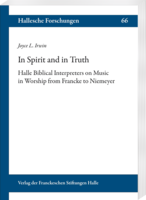|
weitere Titel zum Thema:
Download:
Bitte beachten Sie: Mit digitalen Produkten in Ihrem Warenkorb
wird die Bezahlung nur per PayPal möglich. Der Download dieser Produkte wird bereitgestellt, wenn die Bezahlung bestätigt ist. Pietism was repeatedly confronted with the accusation that it was hostile to art. In the late 17th century, for example, ornate church music met with criticism from many Pietists. At the same time, they appreciated music as an important component of public worship, which should deepen the piety of the converted and appeal to the hearts of the unconverted. However, this was preceded by the conviction that the criterion for appreciating music was to be found in the faith convictions of the composer and performer themselves. This tension underlies the musical thinking of Halle's theologians in the 18th century. The study by Joyce L. Irwin refrains from dealing with polemical literature in the environment of Pietism, but rather draws on texts that treat passages of the Bible dealing with music.
In addition to the biblical commentaries of August Hermann Francke, Joachim Lange, Johann Jakob Rambach, Siegmund Jakob Baumgarten, and Johann Salomo Semler, poetic texts also come into view, such as the hymnals of Freylinghausen, the poems of Rambach, and the poetry and drama of August Hermann Niemeyer. In the process, it becomes apparent that music in Pietism is essential for the service to God, but that the spiritual conviction of the individual remains crucial. |
|||||||||||||||||||||||||||||||||||||||






